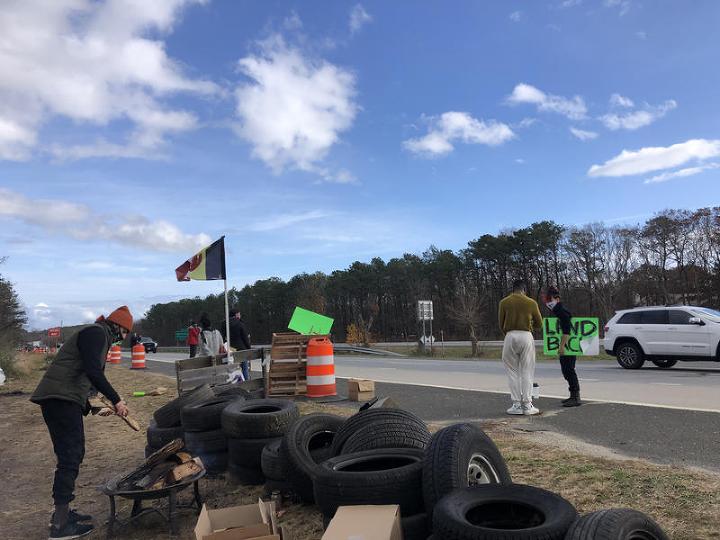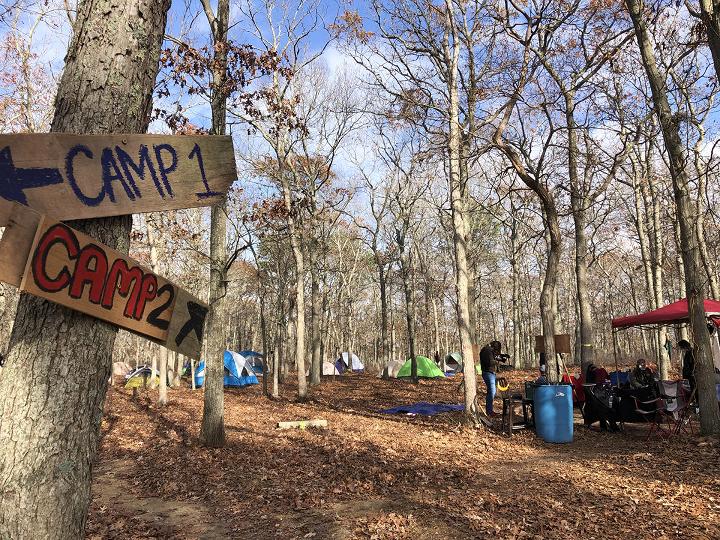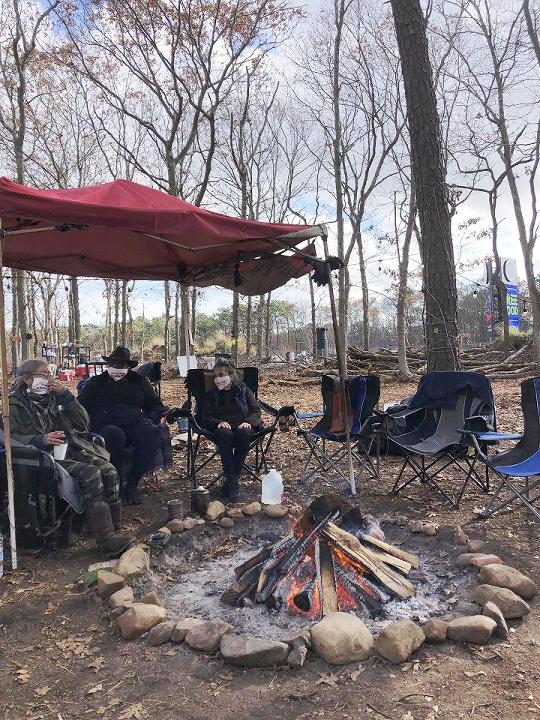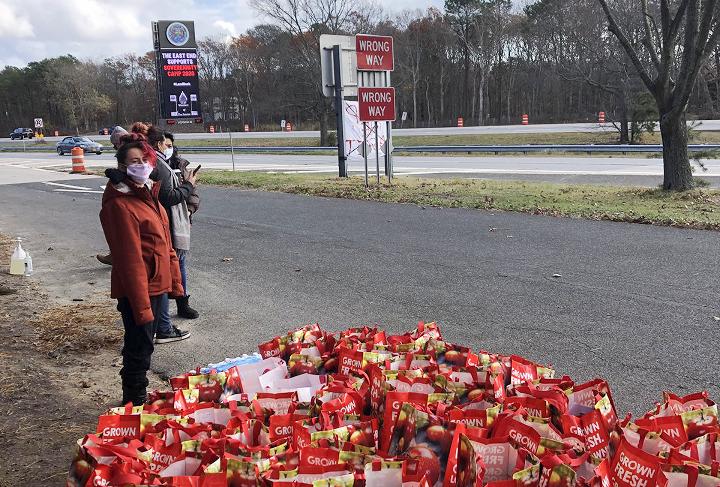 |
Canku Ota
|
 |
|
(Many Paths)
|
||
|
An Online Newsletter
Celebrating Native America
|
||
|
January 2021 - Volume
19 Number 1
|
||
|
|
||
|
Shinnecock Nation
Asserts Sovereignty At Sunrise Highway Encampment
|
||
|
by Julia Press - WSHU
Public Radio
|
||
For 26 days, Shinnecock residents camped out along the Sunrise Highway — the only road in and out of the Hamptons. “We've had snow, we've had rain, we've had sleet, we've been under tornado watch,” said Tela Troge. She’s a member of Warriors of the Sunrise, the group of Shinnecock women who organized the occupation. Troge said that this “Sovereignty Camp” was spurred by a recent dispute with state and local government over a 61-foot tall electronic billboard. The Shinnecock Nation built this monument along the highway to generate advertising revenue. Troge, who’s a lawyer, spent years on the legal research to prove that it was on Shinnecock land.
“Ever since the monument sign went up, New York state has fought tooth and nail against it, along with the town of Southampton,” she said. Southampton Town Supervisor Jay Schneiderman had criticized the monument as “out of character” for the area in 2019 during its construction. And the state of New York followed up with a lawsuit, trying to force the Nation to remove the sign. “It's just quite frankly not in touch with reality,” Troge said of the lawsuit. “This is Indian land. New York State has to respect Indian sovereignty.” The state lost its lawsuit over the summer, but it’s continuing to appeal the case, and that means most of the revenue the Nation would be making from the billboard has to be funneled back into litigation, according to Troge. “As soon as New York state drops the lawsuit, we won't have to spend the money on legal firms,” Troge said. “We can use it to feed people and to make sure that our elders have everything they need and that our babies have everything that they need.” Jennifer E. Cuffee-Wilson credits her Shinnecock family with keeping her alive through poverty. They let her use their showers and brought her electric blankets while she was living in a tent. “I wouldn't have survived almost two years that I lived there because the Nation, they couldn't help me,” she said. A high percentage of the Shinnecock reservation lives in poverty. Even as a federally recognized tribe, Cuffee-Wilson said they’ve never been given enough to support their people. “Shinnecocks have been very good neighbors to the town of Southampton since 1640 and, in return, they have not respected us at all," Cuffee-Wilson said. "They have literally stole our land from us and when we worked on opportunities so we could have our own funding, they have stopped us.”
The high level of poverty among the Shinnecock Nation stands in stark comparison to the surrounding area, home to a number of wealthy individuals, and with real estate prices among the highest in the country. Margo Thunderbird, a Shinnecock elder, said while that’s always been the case, the Shinnecock people’s relationship with their neighbors has changed since the 1950s. “It used to be more of a genteel racism,” Thunderbird said. “They were generous with their donations to the poor dear Indians but called us things like the poor dear Indians.” Thunderbird said in recent years, the Nation has started speaking up against overdevelopment destroying the natural landscape, and in support of Indigenous rights to land and economic opportunity. That hasn’t always gone over well. “If you notice at the top of that monument is the great seal of Shinnecock,” she said, pointing to the monument across the highway. “It signifies that you are now entering Shinnecock territory, and it honors our ancestors, and it puts us on a map they don't want us to be on. But here we are.”
As part of the encampment, the Warriors of the Sunrise gave out 500 free bags of food to local Hamptons residents — full of Indigenous staples like turkey, salmon, fresh corn and sweet potatoes. They also taught encampment visitors about Indigenous land rights and the history of Shinnecock oppression. Troge, the lawyer who did legal research for the monument, said giving back and building good will with their neighbors is what the Nation has always tried to do. “This is our history: Generosity, kindness and love. What is your history? What legacy do you as a state and a town want to leave? Because right now, it's not a very good one,” Troge said. The town of Southampton said it had no issues with the encampment and that it will continue to work with Shinnecock leaders on economic development projects. A New York State spokesman declined to comment due to pending litigation. The camp disbanded on Thanksgiving Day, which coincides with a National Day of Mourning for many Indigenous people in New England. But participants were clear that this was part of a much larger movement that they hope many other allies will join in. |
||||||||
The
Shinnecock and neighboring tribal bands
|
|
|
||
|
|
||
| Canku Ota is a free Newsletter celebrating Native America, its traditions and accomplishments . We do not provide subscriber or visitor names to anyone. Some articles presented in Canku Ota may contain copyright material. We have received appropriate permissions for republishing any articles. Material appearing here is distributed without profit or monetary gain to those who have expressed an interest. This is in accordance with Title 17 U.S.C. Section 107. | ||
|
Canku Ota is a copyright ©
2000 - 2021 of Vicki Williams Barry and Paul Barry.
|
||
 |
 |
|
|
The "Canku
Ota - A Newsletter Celebrating Native America" web site and
its design is the
|
||
|
Copyright ©
1999 - 2021 of Paul C. Barry.
|
||
|
All Rights Reserved.
|
||




